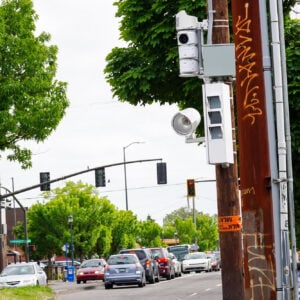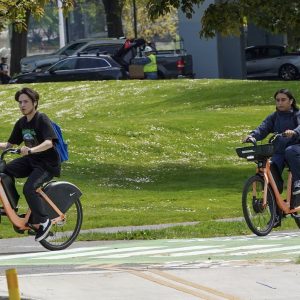
The City of Portland Auditor’s Office has released its seventeenth annual Resident and Business Surveys. The lengthy survey includes an assessment of all City services, including the Office of Transportation.
The results show a 1% increase in bike commute mode share over last year and a major dip in the perception of bicycle safety (more details below).
According to Robert Cowan, a public information staffer at the Auditor’s Office, the survey was sent out on August 3rd of this year and 20,400 randomly selected people from 75 different neighborhoods responded to the survey. All responses were in by September 10th.
Here’s how people responded to the question about bike safety.
In general, how do you rate the streets in your neighborhood on the safety of bicycles?
- Very good – 7%
- Good – 40%
- Neither – 27%
- Bad – 19%
- Very bad – 8% (in SW it was 14%)
The 47% of Portlanders that responded with “Very good” or “Good” is the lowest since 2002 and represents a 7% decline over last year, the largest dip since the question was first asked (in 2000).
As a side note, it might be important to consider that on August 17th, a man tried to intentionally run-down a cyclist in SE Portland. This road rage case (full coverage here) received considerable media attention and might have influenced some responses.
The survey also asked residents about their commuting habits.
If you work outside of your home, what mode of transportation do you usually use to get to and from work? [Here are the results of the folks who answered “bicycle”].
- SW – 3%
- NW/Downtown – 4%
- North – 6%
- Inner NE – 12%
- Central NE – 4%
- SE – 10%
- East – 1%
- City Total – 6%
This number has increased one percentage point since last year.
In the next few weeks, the Auditor’s office will release neighborhood-by-neighborhood breakdowns of the survey results.
To download the complete survey as a PDF and learn more about the methodology, visit the Auditor’s website.







Thanks for reading.
BikePortland has served this community with independent community journalism since 2005. We rely on subscriptions from readers like you to survive. Your financial support is vital in keeping this valuable resource alive and well.
Please subscribe today to strengthen and expand our work.
Interesting. Although I ride everywhere I go, I would agree with \”Neither to Bad\” safety rating of Portland streets overall. Not because I don\’t think we are making improvements, but because of the nature of recent incidents and the overall lack of interest in bicyclist\’s rights by the motoring community in general. Sure there are few who are interested, but by and large your average \” Joe Leadfoot\” of the world could really care less, especially if my right to safety causes him to not make the next green light.
I think we are at the tipping point though. We just need to keep advocating and working with the city to hear our collective voice. Hopefully we can make the improvements needed to swing the pendulum in our favour.
We\’re improving, slowly. I think a big part of the problem is that we still aren\’t getting the safety improvements that we need. There are more and more cyclists on the road, but we\’re still a low priority in the eyes of alot of people.
At the same time I know alot of people who, while they don\’t ride themselves, feel that more bike saftey is important to them because they don\’t want to hurt anyone by accident.
\”The results show a 1% increase in bike commuting\”
I may be misinterpreting, but I think the above statement is misleading. The total mode share for biking increased by 1%, from 5% to 6%.
If population remained constant, an increase of 5% mode share to 6% mode share is a 20% increase in the number of bikers, correct?
My family happened to be among the 20,400 surveyed. I answered neither because while most Portland motorists are conscientious and polite, the elected and appointed city leadership does not make rooting-out and enforcement of the dangerous minority a remote priority.
Until the dangerous minority are made to feel they will be persecuted by the \”system\” (as in Denmark for instance), street safety cannot be considered good.
I wonder how the 6% of the survey respondants who are regular bike commuters answered the question on safety? Seems to me like they\’d have the best-informed opinion on the matter.
Comment #3
Yes. Page 6 of the report shows that the mode usage went from 5% to 6%, so the mode share increased by 1%, but cycling\’s mode share increased 20%.
By further comparison, the percentage of people who \”drive with others\” is 7% and the percentage who use bus or Max is 10%.
Bicycling is about to catch carpooling and is 60% of the way to catching Trimet.
Page 6 doesn\’t really deal with mode share. It only asks how you usually get to work. An increase from 5% to 6% in the answer to this question may indicate that 1% of people have gone from riding their bike 40% of the time to riding it 60% of the time, or that people have gone from never riding their bike to cycling every day, you just can\’t tell.
People who responded they usually drive could also bike or take max 1 day a week, the way the question is phrased it is difficult to parse out the actual mode share of respondents.
Getting a walk/bike mode share up over 30% doesn\’t necessarily require us to get 30% of portlanders to give up their cars, it could just mean making a city where the easiest, fastest, most conveinent way to get where you are going is to walk/bike 30-40% of the time.
Bjorn
I think the timing of the survey being at the end of the \”fair weather\” bike commute season may have an impact on those numbers. Anyone who commutes year round can see the numbers rise and fall with teh season, with less radical variations with good and bad weather patches in all four seasons.
I think the numbers are therefore a bit high.